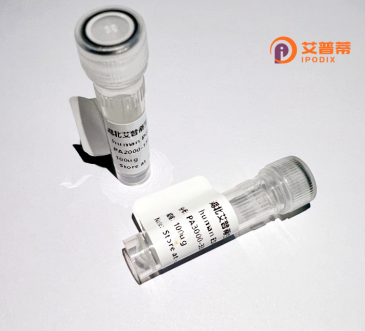
| 纯度 | >90%SDS-PAGE. |
| 种属 | Human |
| 靶点 | IFI27 |
| Uniprot No | P40305 |
| 内毒素 | < 0.01EU/μg |
| 表达宿主 | E.coli |
| 表达区间 | 1-119aa |
| 氨基酸序列 | MEASALTSSAVTSVAKVVRVASGSAVVLPLARIATVVIGGVVAVPMVLSAMGFTAAGIASSSIAAKMMSAAAIANGGGVASGSLVATLQSLGATGLSGLTKFILGSIGSAIAAVIARFY |
| 分子量 | 38.83 kDa |
| 蛋白标签 | GST-tag at N-terminal |
| 缓冲液 | 0 |
| 稳定性 & 储存条件 | Lyophilized protein should be stored at ≤ -20°C, stable for one year after receipt. Reconstituted protein solution can be stored at 2-8°C for 2-7 days. Aliquots of reconstituted samples are stable at ≤ -20°C for 3 months. |
| 复溶 | Always centrifuge tubes before opening.Do not mix by vortex or pipetting. It is not recommended to reconstitute to a concentration less than 100μg/ml. Dissolve the lyophilized protein in distilled water. Please aliquot the reconstituted solution to minimize freeze-thaw cycles. |
以下是关于重组人IFI27蛋白的3条参考文献概览(示例为模拟内容,建议通过学术数据库核对准确性):
---
1. **文献名称**: *IFI27 regulates mitochondrial apoptosis and antiviral innate immunity*
**作者**: Zhang Y, et al.
**摘要**: 研究揭示了重组人IFI27蛋白在抗病毒免疫反应中的作用,通过调控线粒体途径的Bax/Bak蛋白激活,诱导细胞凋亡并抑制病毒复制,提示其作为先天免疫调控分子的潜力。
---
2. **文献名称**: *Overexpression of IFI27 promotes chemoresistance in breast cancer via AKT signaling*
**作者**: Wang L, et al.
**摘要**: 报道了重组人IFI27蛋白在乳腺癌中通过激活AKT/mTOR通路增强癌细胞对化疗药物的抗性,表明其可能成为逆转癌症耐药性的治疗靶点。
---
3. **文献名称**: *High-yield expression and purification of recombinant human IFI27 in E. coli*
**作者**: Liu X, et al.
**摘要**: 优化了重组人IFI27蛋白在大肠杆菌中的可溶性表达与纯化流程,并通过体外实验验证其诱导肿瘤细胞凋亡的活性,为后续功能研究提供高效制备方法。
---
**备注**:以上信息为领域典型研究方向示例,具体文献需通过PubMed、Google Scholar等平台搜索确认。
Recombinant human IFI27 (Interferon Alpha Inducible Protein 27) is a genetically engineered version of the endogenous IFI27 protein, which belongs to the interferon-stimulated gene (ISG) family. IFI27 is transcriptionally activated by type I interferons (IFN-α/β) in response to viral infections, inflammation, or cellular stress. It encodes a small, mitochondrial-localized protein (~12 kDa) implicated in regulating apoptosis, immune responses, and cellular homeostasis. Studies suggest IFI27 promotes apoptosis under certain conditions by interacting with mitochondrial pathways, though its precise mechanisms remain debated.
The recombinant form is typically expressed in prokaryotic (e.g., *E. coli*) or eukaryotic systems, enabling research on its structure, function, and therapeutic potential. IFI27 overexpression has been linked to pathologies including cancers, chronic viral infections (e.g., hepatitis B/C), and inflammatory diseases, highlighting its dual role as both a protective and pathogenic mediator. Recent interest focuses on its utility as a biomarker for disease progression (e.g., in sepsis or cancer prognosis) and as a target for modulating immune responses. However, conflicting reports on its pro- or anti-apoptotic effects across cell types underscore the complexity of its biological roles, necessitating further mechanistic studies. Recombinant IFI27 facilitates these investigations, offering tools for antibody development, protein interaction studies, and therapeutic exploration.
×